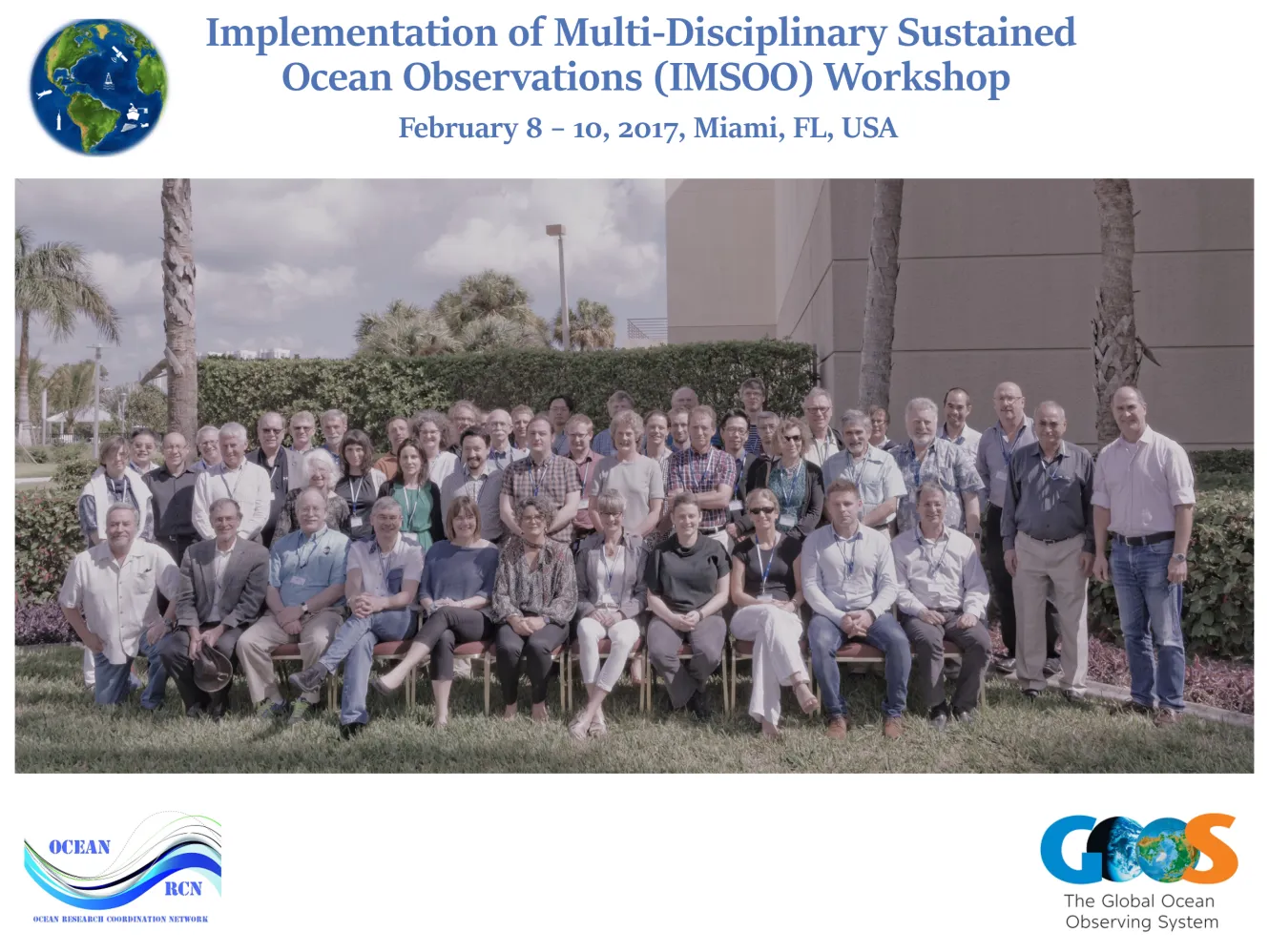On 8-10 February 2017, Global Ocean Observing System (GOOS) Panels for Physics & Climate (OOPC), Biology & Ecosystems and Biogeochemistry (IOCCP), and the Ocean Research Coordination Network (Ocean RCN) co-organized a workshop on "Implementation of Multi-disciplinary Sustained Ocean Observations (IMSOO)".

The 3-day workshop took place at the Florida International University campus, just north of Miami, FL, USA. 49 experts in observing and modelling ocean phenomena, representing 35 institutions from 11 countries, focused their energy on identifying the requirements for and benefits of co-located, multi-disciplinary, sustained observations around three scientific problems: open-ocean - shelf interactions, oxygen minimum zones and plankton community changes. The outcomes of this workshop are set to be instrumental in setting the stage for the upcoming OceanObs'19 Conference.
The initial set of implementable recommendations has been formulated and is published as the Global Ocean Observing System (GOOS) Report No. 223, available for download from here:
IMSOO Workshop Final Report
Summary of Outcomes
The near term outcomes of the workshop are a series of suggested actions and recommended directions for the three demonstration themes including efforts of collaborations across disciplines, observation platforms and networks. The first steps are a series of planning and implementation meetings and workshops planned for 2017 and 2018. Only a few of the planned actions fall within currently funded activities; therefore the groups have started to seek out required resources through funding avenues identified at the workshop.
There was a recognition that new capabilities and new observation systems must be built on existing capabilities and this should be done with minimal impact on the current operations. Examples include the introduction of Biogeochemical Argo to the Argo network and the recommended addition of water sampling for biological measurements to repeat hydrography surveys.
The recommendations called for expanding the range of platforms available for observation including expanded use of autonomous sampling and fixed-point observatories for biogeochemical measurements.
Due to the complexity and widely varying scales of ocean dynamics, modelling plays a key role in addressing the three demonstration themes. Further expansion of models and closer coupling of models with observations was noted as a priority.
Capacity building was another common thread. This includes the use of existing standards and best practices for data management and could include the creation of best practices manuals and similar documentation.
The challenges discussed by the participants for each demonstration theme are not new, however, the emphasis on multi-disciplinary information and collaboration was a step forward in expanding traditional dialogues. The planning with a multi-year perspective offers the opportunity for advances that otherwise could take a decade of evolution.
Details of planned actions summarized in the report will now be followed through by the organizers over the next 2-5 years' time frame.
We hope for a strong community involvement in the process!
Background
Since the OceanObs'09 Conference, the ocean observing community has been improving coordination and collaboration amongst physical, biogeochemical and biology/ecosystem communities. Societal and scientific requirements for sustained observations have been captured in the GOOS Essential Ocean Variables, many of which are also essential climate variables (ECVs, defined by the Global Climate Observing System reporting to the United Nations Framework Convention on Climate Change (UNFCCC)). Significant progress has been made through the introduction of the Framework for Ocean Observing in 2012 and the creation and refinement of the disciplinary EOVs, based on expert evaluation of feasibility and impact.
With advances in observing technology, and the definition of EOVs, clear opportunities exist to improve the coordinated planning and implementation of observing activities measuring EOVs across the three disciplines.
The IMSOO workshop was designed to identify priority steps forward by bringing together users of established observing networks and experts in EOVs and science in all three ocean observation disciplines.
Workshop objective and strategy
The major aims of the workshop were:
- Building on the established societal and scientific requirements expressed in EOVs, identify the key applications and phenomena that will benefit from co-located multi-disciplinary sustained observations
- Identify near-term innovation priorities for observing platforms and sensors to enable multi-disciplinary observations, and
- Identify programmatic and professional connections between existing and emerging observing networks that will increase multi-disciplinary observations
Most of the workshop was spent in breakout groups where priority steps for implementation of multi-disciplinary sustained observations were discussed with respect to three demonstration themes:
- Changes in plankton communities
- Oxygen minimum zones
- Open ocean - shelf interactions
These themes were chosen because they represent global and challenging problems that are best addressed through collaboration of physical, biogeochemical and biological observations and analyses. Examining these three preselected themes provided a mechanism for looking at convergence across the ocean observing disciplines. Each breakout group composed of both experts and non-experts in a particular theme, effectively introducing a wider perspective and a more critical approach to fulfilling the workshop aims.
Organizing Committee
Nic Bax, GOOS Biology & Ecosystems Panel
Mark Bourassa, GOOS Physics Panel
Albert Fischer, GOOS Office Director
Katherine Hill, GOOS Physics Panel
Bob Houtman, NSF
David Legler, NOAA / JCOMM
Eric Lindstrom, NASA
Patricia Miloslavich, GOOS Biology & Ecosystems Panel
Jay Pearlman, IEEE & OceanObs RCN
Samantha Simmons, GOOS Biology & Ecosystems Panel
Bernadette.Sloyan, GOOS Physics Panel
Toste Tanhua, GOOS Biogeochemistry Panel
Maciej Telszewski, GOOS Biogeochemistry Panel
Sponsors
We kindly thank our generous sponsors: US NSF, GOOS/IOC-UNESCO, NOAA, NASA

